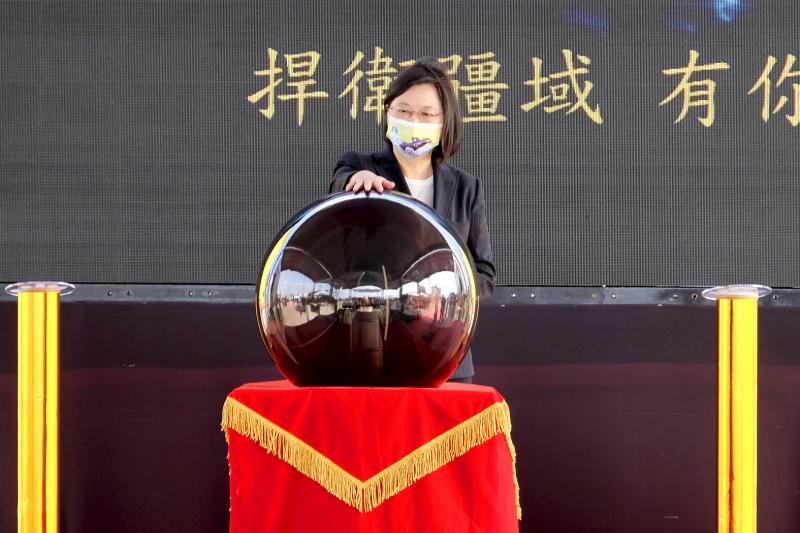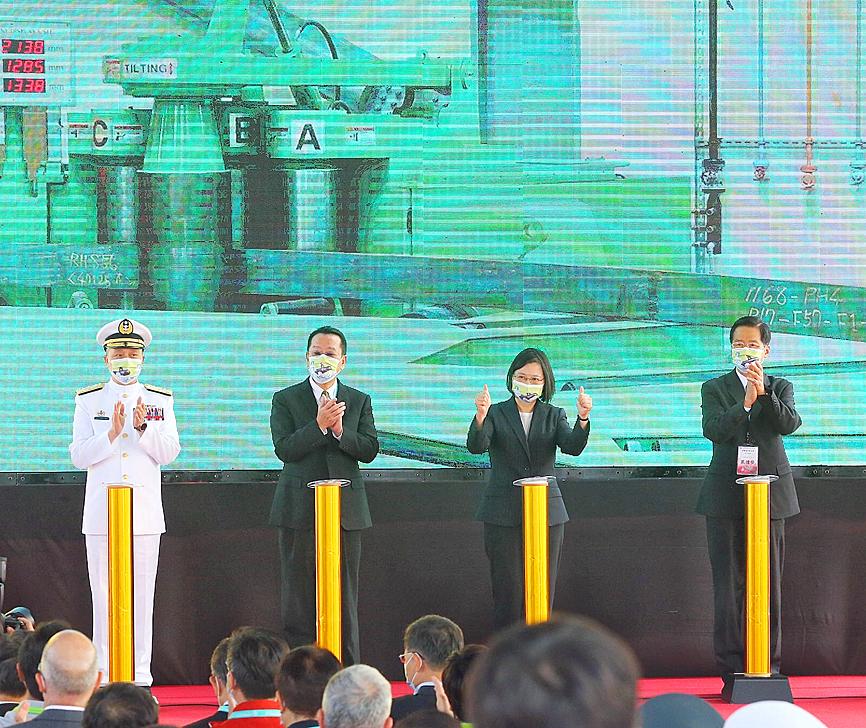President Tsai Ing-wen (蔡英文) yesterday presided over a ceremony to mark the start of construction of the nation’s first indigenous submarine at state-run shipbuilder CSBC Corp’s (台灣國際造船) shipyard in Kaohsiung.
“This submarine is an important part of allowing our navy to develop asymmetric warfare and to intimidate and block enemy ships from surrounding Taiwan’s main island,” Tsai said. “With the construction of the submarine to its future commission, we will certainly let the world know our persistence in safeguarding our sovereignty.”
Tsai has made boosting the nation’s indigenous defense capacity a central pillar of her defense policy. She recently relaunched the military aviation industry with the production of new trainer jets and has pushed for the development of more sophisticated systems by utilizing the domestic high-tech industries.

Photo: Wu Huizhong, AP
At the same time, she has gained approval from the US for the purchase of billions of US dollars in weapons, including upgraded F-16 jets, armed drones, rocket systems and Harpoon missiles capable of hitting ships and land targets.
China has stepped up military exercises toward Taiwan this year, flying fighter jets and reconnaissance planes on an almost daily basis toward the nation.
Taiwan turned to the expensive and time-consuming task of building its own submarines after Beijing prevented it from purchasing such craft from abroad through the use of economic and diplomatic threats.

Photo: CNA
Only a handful of countries around the world are capable of manufacturing submarines for modern warfare and Taiwan’s move toward that step has taken years. The Taiwanese submarine’s designs have reportedly drawn on foreign expertise, despite the obstacles thrown up by China.
CSBC was awarded the contract to design and build the subs in 2016, in partnership with arms developer the Chungshan Institute of Science and Technology.
Plans call for the building of eight indigenous submarines at an estimated cost of more than US$16 billion, with the first one to be completed by 2025.
The program, known as the Haichang Project (海昌計劃), has already faced criticism over its cost. The design phase itself was estimated to cost about NT$3 billion (US$104 million).
The submarine has been in the design stage for four years, overcoming all sorts of difficulties that could not be revealed to the public, CSBC chairman Cheng Wen-lon (鄭文隆) said yesterday.
The project is staffed by a team of about 200 technicians with an average age of only 34, making them “major assets” to the future of the domestic defense industry, he said.
Tsai conceded that the program was a struggle, but said her government would not be deterred.
“Walking on this path that historically the government has never taken before, there were all kinds of challenges, and we were met with all sorts of doubts, but challenges and doubts won’t defeat us,” Tsai said, standing in front of the workshop where the submarine parts are to be manufactured.
Minister of National Defense Yen De-fa (嚴德發), National Security Adviser Wellington Koo (顧立雄), American Institute in Taiwan Director Brent Christensen, legislators and members of the design team attended the ceremony.
Although Washington has no formal relations with Taipei, it remains Taiwan’s main ally, and US law requires the government to ensure that Taiwan can defend itself.
Weapons sales to Taiwan have increased in quantity and quality in the past few years, especially under US President Donald Trump’s administration.
Facing a potential Chinese foe with overwhelming superiority in missiles, soldiers, ships and planes, Taiwan has struggled to assure its own people, as well as the US, that it is capable of and willing to defend itself.
Along with the world’s largest standing military, numbering about 2 million members, China has the largest navy, with approximately 350 vessels, including two aircraft carriers and about 56 submarines.
It also possesses about 2,000 combat fighters and bombers and 1,250 ground-launched ballistic missiles, considered a key strategic and psychological weapon against Taiwan.
Taiwan’s armed forces are a fraction of that number, with much of its ground force consisting of short-term conscripts, and its fleet numbers only about 86 vessels, about half of them missile boats for coastal patrol.
The navy has just two combat-ready submarines, versions of the Zwaardvis-class subs purchased from the Netherlands in the 1980s in a deal that led to a major diplomatic rift between Bejing and The Hague.

INVESTIGATION: The case is the latest instance of a DPP figure being implicated in an espionage network accused of allegedly leaking information to Chinese intelligence Democratic Progressive Party (DPP) member Ho Jen-chieh (何仁傑) was detained and held incommunicado yesterday on suspicion of spying for China during his tenure as assistant to then-minister of foreign affairs Joseph Wu (吳釗燮). The Taipei District Prosecutors’ Office said Ho was implicated during its investigation into alleged spying activities by former Presidential Office consultant Wu Shang-yu (吳尚雨). Prosecutors said there is reason to believe Ho breached the National Security Act (國家安全法) by leaking classified Ministry of Foreign Affairs information to Chinese intelligence. Following interrogation, prosecutors petitioned the Taipei District Court to detain Ho, citing concerns over potential collusion or tampering of evidence. The

NEGOTIATIONS: Taiwan has good relations with Washington and the outlook for the negotiations looks promising, Minister of Economic Affairs J.W. Kuo said Taiwan’s GDP growth this year is expected to decrease by 0.43 to 1.61 percentage points due to the effects of US tariffs, National Development Council (NDC) Minister Paul Liu (劉鏡清) said at a meeting of the legislature’s Economics Committee in Taipei yesterday, citing a preliminary estimate by a private research institution. Taiwan’s economy would be significantly affected by the 32 percent “reciprocal” tariffs slapped by the US, which took effect yesterday, Liu said, adding that GDP growth could fall below 3 percent and potentially even dip below 2 percent to 1.53 percent this year. The council has commissioned another institution

NEGOTIATIONS: The US response to the countermeasures and plans Taiwan presented has been positive, including boosting procurement and investment, the president said Taiwan is included in the first group for trade negotiations with the US, President William Lai (賴清德) said yesterday, as he seeks to shield Taiwanese exporters from a 32 percent tariff. In Washington, US Trade Representative Jamieson Greer said in an interview on Fox News on Thursday that he would speak to his Taiwanese and Israeli counterparts yesterday about tariffs after holding a long discussion with the Vietnamese earlier. US President Donald Trump on Wednesday postponed punishing levies on multiple trade partners, including Taiwan, for three months after trillions of US dollars were wiped off global markets. He has maintained a 10 percent

TRADE: The premier pledged safeguards on ‘Made in Taiwan’ labeling, anti-dumping measures and stricter export controls to strengthen its position in trade talks Products labeled “made in Taiwan” must be genuinely made in Taiwan, Premier Cho Jung-tai (卓榮泰) said yesterday, vowing to enforce strict safeguards against “origin laundering” and initiate anti-dumping investigations to prevent China dumping its products in Taiwan. Cho made the remarks in a discussion session with representatives from industries in Kaohsiung. In response to the US government’s recent announcement of “reciprocal” tariffs on its trading partners, President William Lai (賴清德) and Cho last week began a series of consultations with industry leaders nationwide to gather feedback and address concerns. Taiwanese and US officials held a videoconference on Friday evening to discuss the